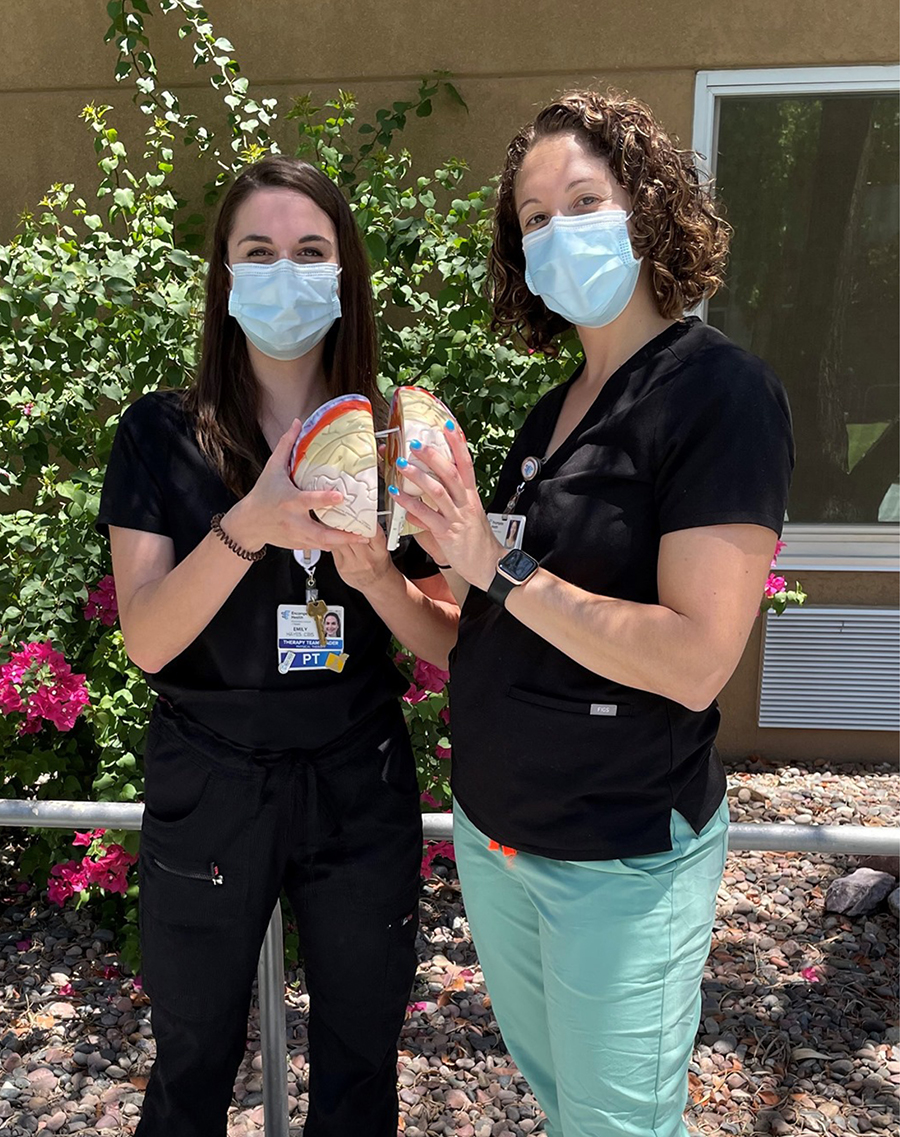The Unexpected Brain Injury Specialist: Meet Emily Hayes
Emily Hayes, a licensed physical therapist by trade, didn’t expect to become a certified brain injury specialist when she began working with in-clinic patients at Encompass Health. Yet today, she c0-facilitates the Virtual Southern Arizona Support Group for the Brain Injury Alliance along with Will Grove.
Emily Hayes, physical therapist, joined her colleague Samantha, physical therapist, celebrating in 2021 as they become a certified neurological specialist!
“The first step is always the hardest, but it’s always worth it.”
The Unexpected Brain Injury Specialist: Meet Emily Hayes
Emily Hayes, a licensed physical therapist by trade, didn’t expect to become a certified brain injury specialist when she began working with in-clinic patients at Encompass Health. Yet today, she c0-facilitates the Virtual Southern Arizona Support Group for the Brain Injury Alliance along with Will Grove.
Emily Hayes, physical therapist, joined her colleague Samantha, physical therapist, celebrating in 2021 as they become a certified neurological specialist!
“The first step is always the hardest, but it’s always worth it.”
As she met more patients and their caregivers, however, she became deeply interested in the unique challenges faced by brain injury survivors.
“Everyone kind of comes to us with a very different story,” Hayes said. “It’s one of those types of injuries where everyone shares certain commonalities but, that being said, everyone’s story is so different.”
Hayes enjoyed the opportunity to find solutions for each unique problem the client needs help with.
For example, she recently helped a brain injury survivor devise strategies for navigating public transportation. Remembering schedules and staying focused in busy, high-stimulus environments can be particularly challenging, and Hayes enjoyed getting out in the community with him to practice navigating the process.
Today, she and Will Grove lead the Southern Arizona Brain Injury Survivor Support group. The Brain Injury Alliance of Arizona group meets virtually every second Tuesday of the month.
It’s an extremely supportive and close group, particularly when it comes to helping each other find actionable solutions to challenges.
“We have a group that is very open in sharing what has worked well for them, or what hasn’t worked,” Hayes said. “We very much have a culture and dynamic of trying to work together to achieve everyone’s goals.”
The group is also a welcoming environment for newcomers.
“For those who are popping in new we do a very good job of making everyone feel welcome and comfortable to share if they would like to,” Hayes said.
For Hayes, leading the group is both personally fulfilling and professionally helpful.
“As a therapist, I learn a lot from the perspective of the survivors,” she said. “I appreciate the opportunity of learning the tips and tricks that everyone has come up with just living with brain injury and bringing that back to my hospital.”
An outside perspective can also prove crucial. Hayes recounted a recent member of the support group who struggled to see their own progress and became frustrated with the process.
“They were really having a hard time seeing the benefits of the work that they were putting into their recovery,” Hayes said. “But the other members of the group, who were kind of tuning into this person monthly, were really able to highlight the progress that this other person was making.”
Hayes also believes the support can be beneficial for survivors who are still on the fence about participating in a support group.
“I would definitely advise if you’re on the fence, go ahead and join a session, even if you make the goal just listening to the first half hour,” Hayes said. “There’s never any pressure to share, but I think there’s great benefit in even listening to other people’s stories.”
After all, Hayes said, “The first step is always the hardest, but it’s always worth it.”
ABOUT BRAIN INJURY ASSOCIATION OF ARIZONA
The Brain Injury Association of Arizona (BIAAZ) is the only statewide nonprofit organization dedicated to improving the lives of adults and children with all types of brain injuries through prevention, advocacy, awareness and education. BIAAZ also houses the Arizona Brain Health Resource Center, a collection of educational information and neuro-specific resources for brain injury survivors, caregivers, family members and professionals.
What began in 1983 as a grassroots effort has grown into a strong statewide presence, providing valuable life-long resources and community support for individuals with all types of brain trauma at no charge.






